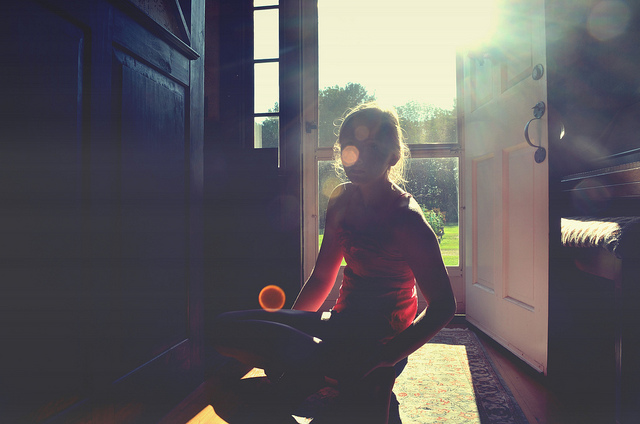“The world is full of magic things, patiently waiting for our senses to grow sharper.”
~W.B. Yeats
For 27 hours and 45 minutes, I went entirely without electronic and verbal communication.
In my own home, on an ordinary weekend, I spontaneously designed a mini, silence retreat.
Since I had attended longer silence retreats with groups at Zen Buddhist centers in the mountains outside L.A. and ashrams in India, I thought to myself—I’ve got this, it’s only one day—failing to take into account how supportive it is, both energetically and physically, to attend an organized retreat with others. Everything is set up for your success. The environment and everyone in it is dragging you along to finish line with their earnest intentions of spiritual salvation.
So why bother trying this on my own? Why would I or anyone want to do this? Aren’t there many more “fun” things one could be doing with their weekend? Well, cost and convenience, for one. But, also, because I really needed it. I was actually craving it. And I found it to be an accessible undertaking all on my own.
A close friend had observed me doling out wonderful, heart-felt advice to mutual friends while seeming a bit disconnected and shut-down when it came to matters of my own heart.
She was right. I felt stuck.
Kind of like I was under murky water, unable to hear or see clearly and lacking the understanding that I just had to lift my face toward the light.
The real gift from silence retreats comes directly after the period of silence. In the days and weeks that follow, I am gifted with clarity, vision, focus, purpose, heightened creativity and, best of all, a space where I act spontaneously from my heart without self-consciousness or expectation.
I wanted that again. I felt the craving. And not just because I am an introvert who needs alone time in order to feel sane. No matter your style of connecting and recharging, eliminating the energy-sucking action of speech, allows for deep rest and psychic renewal as it heightens other, less relied upon, powers of perception.
Until recently, I’ve considered myself an extrovert and a person that thrives in the presence of people. I’ve been seen as a leader who speaks up as well as listens and people gather around me in social situations. Although self-identifying as an extrovert, something compelled me to read Quiet: The Power of Introverts in a World That Can’t Stop Talking and I realized that a lot of my suffering and struggles stemmed from not spending enough time alone.
In reality, I am actually more of an introvert in that being around people drains me and, although I am social, it is crucial for me to recharge in private or I become overwhelmed. Perhaps it’s the introvert in me that craves the silence and solitude but extroverts too will benefit from a drastic reduction in outside influences and distractions.
The past five years of my life have been filled with big transitions: motherhood, a career change and graduate school, divorce, learning to co-parent, embracing my singleness, starting my own business—during this time I learned to greedily grab my solitude or I would implode.
During times of stress, my old habit was to quickly gather my tribe of sisters and girlfriends and talk it out. It’s now clear to me this reflexive reaction was nothing more than low self-esteem resulting in an inability to trust the whispers of my own heart. As the years go on and the inevitable life transitions become more weighty, I’ve realized that seeking advice outside myself is the least effective way to find solace or direction in difficult situations.
All the answers lie within my own heart.
And the answers usually make sense to no one but myself. Excessively talking it out and asking others’ opinions puts me in the position of defending myself and what’s on my heart. I find myself resisting others’ ideas not because I am trying to be contrary but because my heart is saying “no, follow me, listen to me!”
Until recently, I thought I had permanently lost the ability to listen to and trust my own heart. As I look back on my 20s, there were plenty of moments of clear-as-day, intuitive messages vividly broadcasting themselves to my consciousness. Things that I just knew. And, yet, I did not trust myself to act on this knowing. I needed outside counsel, additional approval, external votes. And then, during discussions with those closest to me, I didn’t have the confidence to defend the internal advice screaming from my heart nor did I realize that I didn’t have to answer to anyone who expected me to defend my unique position.
Even though I’ve accepted that solitude is necessary for me and I trust myself more fully than ever before, I am still prone to go off the rails and get distracted by the business of life; therefore, a spontaneous silence retreat was on order.
Merely living alone and; therefore, not speaking to anyone for a few days does not make for a silence retreat. True silence is intentional and this mindfulness changes the outcome from a quiet restfulness due to being alone into a super-charged, alert wakefulness from focused silence.
At organized silence retreats, journaling and reading are strongly discouraged. You are instructed not to give your mind anything to hold on to or work with. Without distractions your mind goes ballistic and roves wildly and aggressively from topic to topic. The resistance hits a fever pitch within the first 24 hours and right when you’ve decided to sneak out of your bunk in the middle of the night and haul ass home so you can at least talk—or something—everything goes quiet and you are flooded with joy as well as relief. When attempting silence at home, schedule as many meditative and self-care activities as you can: long walks, yoga, being in nature, baths, naps and even cleaning your house in a gentle, mindful manner while being conscious of your thoughts can be supportive.
At times of boredom and restlessness, I found myself obsessing about food and meal preparation or panicking that my ex-husband suddenly needed my consent for our child’s imagined, emergency surgery. Not usually one prone to catastrophizing, the drama my grasping ego was able to drum up surprised me.
In reality, my children needed nothing from me and were in safe, capable hands; however, the total lack of communication was making me feel insignificant and not needed. When I started down the rabbit hole of projections and assumptions leading me to abandon the project altogether, I turned to my journal and reaffirmed my purpose for this day. It was to quiet my mind, quiet the outside influences, quiet the planning and future-tripping and get very real about what was on my heart so I could move forward with a sense of purpose and joy.
I come from a long line of doers and busybodies and as I am still in transition with quite a few big things in my life (as we all are), I have to consciously resist the urge to constantly do and instead just be. Otherwise the waters get murky and I start to drown in others’ expectations and advice.
If I don’t slow down, I’ll miss the next set of instructions (from my heart) and the opportunity to take effortless action. If I insist on continuing with my perpetual-motion-machine, I may eventually end up at the same place as my heart’s intentions but with wasted energy and a missed opportunity to live in the flow.
In the days the followed the silence, I felt myself crackling with vitality and gathering information through a source other than my eyes, ears and brain. There seems to be cumulative affect to all these periods of silence I’ve experienced.
When I take the time to power-down and tune-in, the period of bliss expands and deepens, ensuring that I will attempt, once again, to silence my mind and ego on another random weekend.
Relephant:
Slow down, be still, be quiet & it will come.
Author: Tahirih Linz
Editor: Catherine Monkman
Photo: Haley/Flickr






Read 0 comments and reply